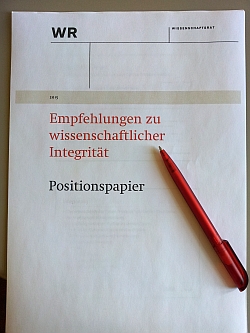Posted: April 26th, 2017 | Author: Sven | Filed under: found on the net, German, Opinion | Tags: Replication, reproducibility | Comments Off on German Research Foundation (DFG) publishes Statement on Replicability
 The German Research Foundation (DFG) has currently released a statement on the replicability of research results.
The German Research Foundation (DFG) has currently released a statement on the replicability of research results.
Interestingly (at least for me), the five-pager first starts with a broader definition of what replicable research is NOT.
Of course, replication is a very important method for testing empirical knowledge claims based on experimental and quantitative research in medicine, the natural, life, engineering, social and behavioural sciences, as well as the humanities.
But, according to DFG, there are limitations:
- Replicability is not a universal criterion for scientific knowledge.
- Ascertaining the replicability or non-replicability of a scientific result is itself a scientific result. As such, it is not final but subject to methodological scepticism and further investigation.
- Non-replicability is not a universal proof by falsification.
- Non-replicability is not a universal indicator of poor science.
‘Well, an unorthodox starting point for a paper on reproducible research‘ – so, at least, were my thoughts when I read the first page of the statement. Wouldn’t it be more common to first depict the important aspects of reproducible research and to suggest measures to support it, instead of rowing back at the beginning of such a statement? Read the rest of this entry »
Posted: April 5th, 2016 | Author: Sven | Filed under: Data Sharing, EDaWaX, Opinion | Tags: replication studies | Comments Off on Note on “research parasites” published in SCIENCE
 Benedikt Fecher and Gert G. Wagner, both also affiliated with the EDaWaX-project, have just published a note in a recent issue of sience under the title “A research symbiont”.
Benedikt Fecher and Gert G. Wagner, both also affiliated with the EDaWaX-project, have just published a note in a recent issue of sience under the title “A research symbiont”.
The background for their note is the editorial of D. Longo and J. Drazen – two editors of the New England Journal of Medicine – published in January 2016. In the editorial, Longo and Drazen critically assessed the concept of data sharing in medicine. Their main concern is that a “new class of research person will emerge” that uses data, which were gathered by other researchers, for their own original research questions. The authors, although indirectly, later referred to this class of researcher as “research parasites”.
Fecher and Wagner argue contrarily: For them, the two editors of the New England Journal of Medicine miss the core of the scientific paradigm when writing that researchers may “even use the [open] data to try to disprove what the original investigators had posited.” Instead, Fecher and Wagner argue that data users are research symbionts and benefit the research ecosystem: Using research data to try to disprove a result is good scientific practice, especially in light of the replication crisis (not only) in the social sciences.
A longer version of the Fecher’s and Wagner’s note is available open access (working paper).
Picture: “share-computer-key-260″ by Emilio Quintana on flickr.com. License: CC BY-NC-SA 2.0
Posted: April 28th, 2015 | Author: Sven | Filed under: German, journals, Opinion, Report | Tags: ethics, German Council of Science and Humanities | Comments Off on German Council of Science and Humanities publishes Recommendations on Scientific Integrity
Yeste rday, the German council of Science and Humanities (Wissenschaftsrat) published a 54-page position paper on scientific integrity (unfortunately in German only). In a press release the scientific body stated:
rday, the German council of Science and Humanities (Wissenschaftsrat) published a 54-page position paper on scientific integrity (unfortunately in German only). In a press release the scientific body stated:
“Prosperity and development of modern societies today depend to a large extent on the quality and progress of scientific knowledge. Therefore it is important that the public can trust in the ethical and quality standards of the scientific community. Cases of fraud and misconduct – particularly major fraud and plagiarism scandals – undermine that trust. In response to such cases of fraud and loss of confidence many scientific organisations have published rules and guidelines dedicated to a Good Scientific Practice in the last few years. The German council of Science and Humanities now has adopted a position paper and recommendations on scientific integrity.” Read the rest of this entry »
Posted: February 5th, 2014 | Author: Sven | Filed under: found on the net, Opinion | Tags: open access, Open Data, open knowledge | Comments Off on Discussion: “It’s the Neoliberalism, Stupid: Why instrumentalist arguments for Open Access, Open Data, and Open Science are not enough.”
 The following blog post is an interesting point of view in the discussion on open science. It originally appeared on Digging Digitally and is reposted under a CC-BY license.
The following blog post is an interesting point of view in the discussion on open science. It originally appeared on Digging Digitally and is reposted under a CC-BY license.
Feel free to comment!
The Open Movement has made impressive strides in the past year, but do these strides stand for reform or are they just symptomatic of the further expansion and entrenchment of neoliberalism? Eric Kansa argues that it is time for the movement to broaden its long-term strategy to tackle the needs for wider reform in the financing and organization of research and education and oppose the all-pervasive trend of universities primarily serving the needs of commerce. Read the rest of this entry »
Posted: April 23rd, 2012 | Author: Sven | Filed under: journals, Opinion | Tags: academic publishing, fraud, psychology, Replication | 1 Comment »
 “If you’re a psychologist, the news has to make you a little nervous…”. With this statement Tom Bartlett introduced his article “Is Psychology About to Come Undone?” in the Chronicle of Higher Education.
“If you’re a psychologist, the news has to make you a little nervous…”. With this statement Tom Bartlett introduced his article “Is Psychology About to Come Undone?” in the Chronicle of Higher Education.
The source of his fears is the Reproducibility Project – a group of researchers that aim to replicate every study within the three journals Psychological Science, the Journal of Personality and Social Psychology and the Journal of Experimental Psychology: Learning, Memory, and Cognition published in the year 2008.
The project is part of Open Science Framework (OSF), a group that is interested in increasing the alignment between scientific values and scientific practices. Despite developing some tools and infrastructure projects its stated mission is to “estimate the reproducibility of published psychological science.”
Read the rest of this entry »
Posted: March 23rd, 2012 | Author: Sven | Filed under: journals, Opinion | Tags: academic publishing, access to data, Linking Data and Publications | 1 Comment »
 Already a while ago, in fall 2010 the Journal of Neuroscience announced that it will stop hosting and peer-reviewing supplementary material for articles, so authors are no longer allowed to include any additional materials when they submit new manuscripts. A radical cut and a practice I haven’t heard of yet.
Already a while ago, in fall 2010 the Journal of Neuroscience announced that it will stop hosting and peer-reviewing supplementary material for articles, so authors are no longer allowed to include any additional materials when they submit new manuscripts. A radical cut and a practice I haven’t heard of yet.
Despite the fact that this journal is neither part of our research sample for EDaWaX’s work package 2 nor in the scientific field of Economics it is worth to investigate the motivation for banning the supplements.
And of course it is interesting to notice what the journal proposes to do instead of hosting and peer-reviewing supplementary material. Read the rest of this entry »
Posted: February 29th, 2012 | Author: Sven | Filed under: Data Sharing, Opinion | Tags: academic publishing, open access, science | Comments Off on Research Works Act: Partial victory for Open Access
 telepolis yesterday reported that the Research Works Act was pulled back. The bill has caused a lot of trouble within the Open-Access and Open-Data Community: HR 3699 would have prevented agencies of the federal government from requiring public access to federally subsidized research.
telepolis yesterday reported that the Research Works Act was pulled back. The bill has caused a lot of trouble within the Open-Access and Open-Data Community: HR 3699 would have prevented agencies of the federal government from requiring public access to federally subsidized research.
A major supporter of the bill, Elsevier, has withdrawed its support for the Research Works Act – only hours before the the co-sponsors of the bill, Darrell Issa (Republican) and Carolyn Maloney (Democrats) declared the end of the legislation process. It’s interesting (but not surprising) that after Elsevier withdrawed its support, the whole bill was stopped. Someone might think, that this course of action shows the real backers of the bill.
Read the rest of this entry »
Posted: January 11th, 2012 | Author: Sven | Filed under: Opinion | Tags: open access, publishing, science | 7 Comments »
 In the course of my research for data policies of economic scholarly journals for the work package 2 of the EDaWaX-project, I stumbled on the proposal H.R. 3699 of the US House of Representatives with claims “To ensure the continued publication and integrity of peer-reviewed research works by the private sector”
In the course of my research for data policies of economic scholarly journals for the work package 2 of the EDaWaX-project, I stumbled on the proposal H.R. 3699 of the US House of Representatives with claims “To ensure the continued publication and integrity of peer-reviewed research works by the private sector”
First I thought, >okay, just another proposal, nothing to worry about<, but when I read more about it, my opinion changed.
From my personal point of view this proposal would seriously threaten public access to federally funded research in the US, when it becomes law. And the question following is, what will happen in Europe, when the publishers succeed in the US?
And this is not only my own perspective: There are libraries and researchers that got upset, too.
Read the rest of this entry »
 The German Research Foundation (DFG) has currently released a statement on the replicability of research results.
The German Research Foundation (DFG) has currently released a statement on the replicability of research results.

 rday, the German council of Science and Humanities (Wissenschaftsrat) published a 54-page position paper on scientific integrity (unfortunately in German only). In a press release the scientific body stated:
rday, the German council of Science and Humanities (Wissenschaftsrat) published a 54-page position paper on scientific integrity (unfortunately in German only). In a press release the scientific body stated: The following blog post is an interesting point of view in the discussion on open science. It originally appeared on
The following blog post is an interesting point of view in the discussion on open science. It originally appeared on  telepolis
telepolis 





